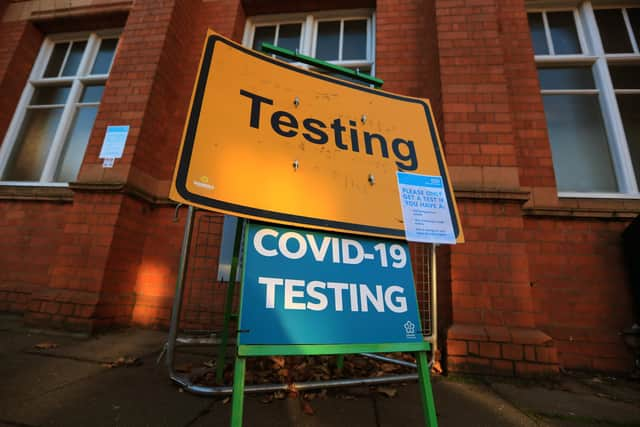The PM can’t afford to bury his head in the sand as new strains of Covid linger - Jayne Dowle
These include fatigue, difficulty concentrating, muscle aches and shortness of breath.
The effects of long Covid on the nation’s health in general however, are less well-known. Just how are we dealing with the aftermath of the worst pandemic in a century? And what happens next?
Advertisement
Hide AdAdvertisement
Hide AdCovid cases in England have now almost doubled in a month after the rise of two new variants.


According to the most recent government statistics available, 875 cases were logged in England on August 11, compared to just 449 a month earlier. Hospital admissions have also risen by a fifth in a week.
The uptick comes after reports of a new variant called Eris, which makes up one in four new cases. Another strain given the name Pirola is quickly spreading globally, official sources say.
This mutation, known as BA.2.86, was identified in the UK last week in an individual with no recent travel history, the UK Health and Security Agency (UKHSA) said.
Advertisement
Hide AdAdvertisement
Hide AdThis means, UKHSA added, that there could already be “significant community transmission”, and it has already emerged in four countries, raising alarm among scientists.
“BA.2.86 is the most striking SARS-CoV-2 strain the world has witnessed since the emergence of omicron,” Francois Balloux, professor of computational systems biology and director of University College London’s Genetics Institute, told the BMJ last week.
What do we do with this information? Especially as a new Royal Society report, ‘Covid-19: examining the effectiveness of non-pharmaceutical interventions’, finds that wearing face masks and face coverings, social distancing, lockdowns, test, trace and isolate, travel restrictions and controls across international borders did help to reduce transmission of coronavirus.
This was positive, if limited, evidence, the report found, that these ‘non-pharmaceutical interventions’, known as (NPIs), worked, especially if used in combinations, and particularly when the intensity of transmission was low, supporting their use early in a pandemic and at first sign of resurgence.
Advertisement
Hide AdAdvertisement
Hide AdThis report, published in the middle of August, when ministers and the Shadow Cabinet are holed up in their Cornish holiday lets or raving in Spain, might easily slip under the radar.
But as reports grow of untold numbers of holidaymakers returning from their trips with an unwelcome souvenir – two lines on a positive Covid test – someone should surely say something?
Only last week my friend came back from a week-long trip to a popular Mediterranean resort and reported that two adults in the six-strong family party had tested positive as soon as they got home.
Cast your mind back just two years – the summer of 2021, more than a year after lockdowns began – and imagine the furore this could have caused. That year, my own family finally made it on a long-awaited trip to Croatia after our 2020 trip was postponed when all but essential overseas travel was forbidden.
Advertisement
Hide AdAdvertisement
Hide AdWhat I remember most about that week’s holiday is the paperwork. Organising (and paying for) five PCR tests before we left, submitting the results online to a mysterious laboratory and crossing our fingers.
Then, the day before we set off to return home, driving us all to a Portakabin near the airport to be tested again, receiving a certificate that we were ‘fit to fly’ and wouldn’t be spending the next fortnight holed up in a quarantine hotel.
The positive-testing people on my friend’s trip didn’t even know they had Covid until they arrived home, so had spent the previous day walking through airports, sitting on a plane, and potentially helping to spread the virus across Europe without even realising. It’s a very sobering thought.
There will always be the cautious still wearing masks to pop to the shops, but very few of us would really welcome the return of mass lockdowns and domestic travel bans, or wish to see our shops, offices, football grounds and places of entertainment shut down again.
Advertisement
Hide AdAdvertisement
Hide AdAnd you can understand how, given Number 10’s history of totally misleading the public over Covid, the last thing Prime Minister Rishi Sunak wants is to come down hard if the latest variants take hold. He’s probably more terrified than anyone else.
However, he can’t afford to bury his head in the sand either.
